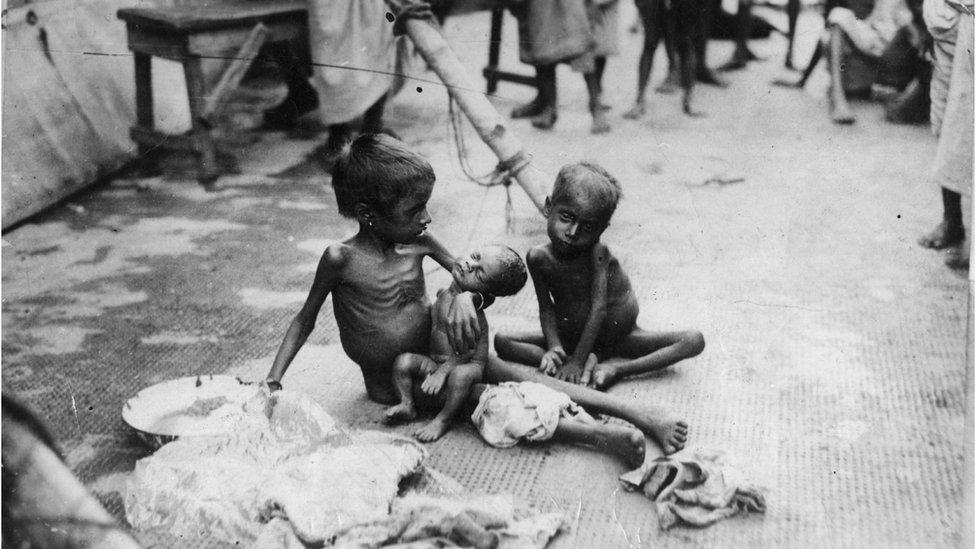MSP Ross Greer brands Churchill 'mass murderer'
- Published
Green MSP Ross Greer on Sir Winston Churchill claims: "Heaven forbid, I tweet like a 24-year-old, because I am a 24-year-old.”
Green MSP Ross Greer has repeated his controversial claim that Sir Winston Churchill was a "white supremacist" and a "mass murderer."
He told the BBC's Politics Live that his view was indisputable and that "history records this".
Mr Greer initially made the comment in response to a Conservative tweet on the anniversary of Churchill's death.
Tory deputy chairman James Cleverly branded it the "most superficial and inaccurate assessment".
The 24-year-old was among a number of people who questioned Churchill's reputation in reply to a Tory tweet last week commemorating the wartime leader's death in 1965.
The post described Churchill as a man regarded by many as the "greatest Briton to have ever lived".
Allow X content?
This article contains content provided by X. We ask for your permission before anything is loaded, as they may be using cookies and other technologies. You may want to read X’s cookie policy, external and privacy policy, external before accepting. To view this content choose ‘accept and continue’.
Mr Greer told the BBC he stood by his comments. Churchill was "indisputably a white supremacist and a mass murderer," he said.
He continued: "The trouble is that here in the UK, we are almost only allowed to talk about Churchill through the prism of not just the Second World War, but the war in Europe.
"Churchill was a man who declared, in his view, the Aryan race would triumph, he described Indians as a beastly people with a beastly religion - and when a mass famine broke out in India, for which he was significantly to blame, the Bengal famine, he said it was their own fault because they bred like rabbits."
Mr Greer went to state that Churchill personally stepped in to overrule his own secretary of state for India, and a future viceroy of India who wanted to divert supplies to help relieve the famine.
Conservative Deputy Chairman James Cleverly likened the Scottish Green MSP to a history student who thought it was clever to "trash" the reputation of a big figure like Churchill.

The 1943 Bengal famine

The Bengal famine of 1943 occurred after a crop failure and the Japanese invasion of Burma cut off rice imports to the region which was then part of British India.
At least three million people are thought to have died, with some estimates putting the figure far higher.
Some historians have said Britain's export of rice from the region was also an important causal factor, along with a "scorched earth" policy in the face of the Japanese advance.
Others, however, have argued that while Churchill refused to divert supplies from other theatres of war, he did push for whatever famine relief efforts India itself could provide, and he later appointed Viceroy Field Marshal Wavell to organise military transport of supplies.

Mr Cleverly believed Mr Greer's view of Churchill was "the most superficial and inaccurate assessment".
He said: "It's worth remembering that one of the reasons why the food aid ships were not diverted to Bengal was because we were in the middle of a war.
"We had been losing ground to the Japanese and the prioritisation was to win the war.
"The idea that we can now judge the language of people brought up in the Edwardian era by our own standards is completely ridiculous."
'Miley Cyrus-isation'
Columnist Isabel Hardman said it was important to acknowledge where great figures got things wrong, but she objected to the tone of Ross Greer's tweet.
She said: "I think this tweet is an example of where our political discourse is going which is a sort of 'Miley Cyrus-isation' of politics where everyone is trying to get attention, including with little clappy hands in the tweet to sort of say 'look at me' - and I don't think that's particularly helpful."
Mr Greer, who three years ago became the youngest person to be elected to the Scottish Parliament, responded: "Heaven forbid that I tweet like a 24-year-old - because I am a 24-year-old."